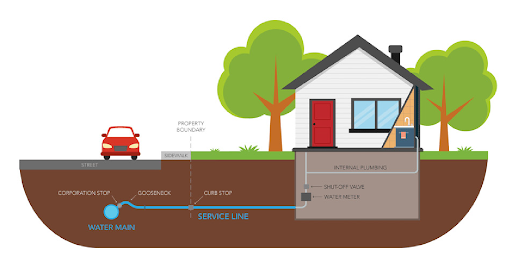April 2, 2019 – The Clinic is releasing a paper analyzing the authority of water utilities in thirteen key states to use ratepayer funds to pay for full lead service line (LSL) replacement. The paper, “Rates Could Fund Lead Pipe Replacement in Critical States,” is the product of a partnership between the Clinic and the Environmental Defense Fund (EDF). Clinic Deputy Director Shaun Goho and Clinic student Marcello Saenz (JD ’19) researched and wrote the paper in collaboration with Tom Neltner, Chemicals Policy Director at EDF. Our analysis concludes that there are no explicit legal barriers to using ratepayer funds for LSL replacement in these states.
LSLs—the pipes that connect the water main under a street to the plumbing in a building—are the largest source of lead in drinking water in those homes that have them (see diagram).

Source: Lead Service Line Replacement Collaborative
Lead exposure can cause a variety of health problems and is particularly dangerous for young children. Drinking water can be a major source of exposure: an Environmental Protection Agency analysis concluded that formula-fed infants may receive 40% to 60% of their exposure to lead from drinking water. As a result, there is broad consensus that all six million LSLs in use around the country will eventually need to be replaced.
It can cost thousands of dollars to replace each LSL, so one major challenge is to figure out how to pay for these replacements. One logical approach is for water utilities to use rates paid by customers. However, because part of each LSL is on private property, some people have argued that ratepayer funds cannot be used because LSL replacement provides a private benefit to the homeowner.
We reviewed the laws of thirteen states, which collectively have an estimated 4.2 million LSLs, more than two-thirds of the nation’s total. In these states, we found no explicit barriers to using rate funds to replace the lines on private property. Publicly-owned utilities can act pursuant to existing state legislation by determining that the practice serves a public purpose—protecting public health. Investor-owned utilities can do the same, but typically need approval of the state’s utility commission. While we have not reviewed the remaining states, we anticipate that the state laws and policies are similar to the ones we evaluated.
